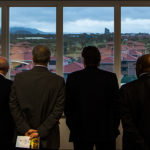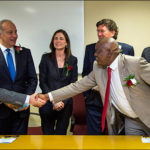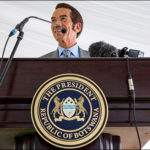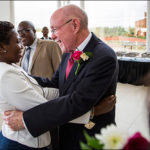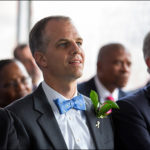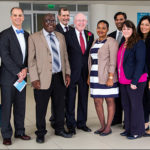February 21, 2017
 Earlier today, Texas Children’s Cancer and Hematology Centers, Baylor College of Medicine International Pediatric AIDS Initiative at Texas Children’s Hospital, the Bristol-Myers Squibb Foundation, His Excellency the President Lieutenant General Dr. Seretse Khama Ian Khama of the Republic of Botswana and the Honorable Minister Dorcas Makgato of the Ministry of Health and Wellness through public-private partnerships with the governments of Botswana, Uganda and Malawi, announced a $100 million initiative to create an innovative pediatric hematology-oncology treatment network in southern and east Africa. The comprehensive initiative called Global HOPE (Hematology-Oncology Pediatric Excellence) will build long-term capacity to treat and dramatically improve the prognosis of thousands of children with cancer and blood disorders in southern and eastern Africa.
Earlier today, Texas Children’s Cancer and Hematology Centers, Baylor College of Medicine International Pediatric AIDS Initiative at Texas Children’s Hospital, the Bristol-Myers Squibb Foundation, His Excellency the President Lieutenant General Dr. Seretse Khama Ian Khama of the Republic of Botswana and the Honorable Minister Dorcas Makgato of the Ministry of Health and Wellness through public-private partnerships with the governments of Botswana, Uganda and Malawi, announced a $100 million initiative to create an innovative pediatric hematology-oncology treatment network in southern and east Africa. The comprehensive initiative called Global HOPE (Hematology-Oncology Pediatric Excellence) will build long-term capacity to treat and dramatically improve the prognosis of thousands of children with cancer and blood disorders in southern and eastern Africa.
In the United States, 80 percent of children with cancer survive. In sub-Saharan Africa, the overwhelming majority of pediatric patients do not survive. The mortality rate is estimated to be as high as 90 percent, meaning thousands of children die from cancer across Africa each year. This is in large part due to an inadequate healthcare infrastructure and a significant lack of expert physicians and other healthcare workers trained to treat children with cancer. The most common types of childhood cancers are blood cancers, including leukemia and lymphoma.
Global HOPE will partner with local Governments and Ministries of Health to build medical capacity to diagnose and treat pediatric blood disorders and cancer in Botswana, Malawi and Uganda. The initiative will also create significant clinical, educational and research capabilities. Doctors, nurses and ancillary professionals will be recruited from around the world to provide training to local healthcare professionals and to begin treating children with blood disorders and cancer immediately.
“This project is building on a solid foundation for pediatric cancer treatment in Botswana that began with pediatric oncologists from Texas Children’s Cancer and Hematology Centers,” said His Excellency the President Lieutenant General Dr. Seretse Khama Ian Khama of the Republic of Botswana. “The Global HOPE program will bring to Botswana the latest bio-medical technologies and the potential to work with local institutions such as the Botswana Innovation Hub and University of Botswana to quickly increase the survival of children with cancer and life-threatening blood disorders in Botswana and the region.”
The Bristol-Myers Squibb Foundation is committing $50 million over five years to fund the training of healthcare providers as well as clinical infrastructure and operations. BIPAI will raise an additional $50 million for the initiative.
“We are eager to get started on this critical initiative to help children with blood disorders and cancer. Working with our partners and drawing on our expertise of building sustainable health systems in underserved countries, we will help make a significant difference in the outcomes for children while creating a blueprint for other countries to follow,” said Dr. Giovanni Caforio, chairman of the board of the Bristol-Myers Squibb Foundation and chief executive officer of Bristol-Myers Squibb Company. “This initiative builds on 18 years of success of the Foundation’s SECURE THE FUTURE program and will offer new hope to families impacted by pediatric blood disorders and cancer.”
As public-private partnerships, the various governments will each play an important role in developing the pediatric hematology-oncology network, assisting with the training, technical assistance, logistics and resources to support Global HOPE.
The Global HOPE initiative will train an estimated 4,800 healthcare professionals from Botswana, Uganda, Malawi and other African countries, including doctors and nurses specializing in pediatric hematology-oncology and social workers. The program estimates that over 5,000 children will receive care in the first five years.
“With only five pediatric oncologists currently in the countries of Botswana, Malawi and Uganda combined, there are simply not enough expert doctors to treat all the children diagnosed with blood disorders and cancer. We believe in these countries there are more than 11,000 new cases annually of pediatric cancer and 40,000 new cases of serious, life-threatening blood disorders such as sickle cell disease and hemophilia. Because of these staggering numbers, more healthcare providers with special expertise are urgently needed,” said Dr. David Poplack, director of Texas Children’s Cancer and Hematology Centers and Professor of Pediatric Oncology at Baylor College of Medicine. “Global HOPE will help build capacity in the region to diagnose and care for children with blood disorders and cancer, offering the potential for transformational change in survivorship for these children.”
The Global HOPE initiative will be modeled on the work of the Bristol-Myers Squibb Foundation, BIPAI and the Governments of Botswana, Uganda and Malawi, which created the largest pediatric HIV treatment network in the world, leveraging existing experience, infrastructure, and public/private partnerships created through the initiative. Since 2003, the Bristol-Myers Squibb Foundation and BIPAI have trained 52,000 healthcare professionals and currently provide care for nearly 300,000 children with HIV and their families in sub-Saharan Africa, lowering the mortality rate for these children to 1.2 percent.
“The success we’ve had in radically changing the course of pediatric HIV/AIDS in sub-Saharan Africa is due in large part to the tremendous support provided by the country governments, healthcare providers on the ground and donors who have made our work possible,” said Dr. Mark W. Kline, president and founder of BIPAI, physician-in-chief of Texas Children’s Hospital and chair of the Department of Pediatrics at Baylor College of Medicine. “We look forward to helping patients and their families by embarking on this unchartered area of cancer care in Africa. Working with our partners, we aim to build a self-sustaining infrastructure that changes the tide of these childhood diseases in sub-Saharan Africa.”
About the Republic of Botswana and the Ministry of Health and Wellness
Botswana is a country with two million inhabitants in southern Africa with abundant and diverse natural resources. The official languages are English and Setswana. Since independence in 1966, Botswana has been a parliamentary republic; the chief of state and head of government is the president. Botswana’s economy is a success story in southern Africa due to the investment of the government in the education, health, clean water and telecommunications sectors to create a better standard of living for its citizens and to foster a conducive environment for free enterprise to prosper. The Ministry of Health and Wellness aims to improve the physical, mental, and social well-being of every citizen of Botswana to fully contribute to the development of Botswana through a healthy nation.
About the Bristol-Myers Squibb Foundation
The Bristol-Myers Squibb Foundation is committed to improving the health outcomes of populations disproportionately affected by serious diseases by strengthening healthcare worker capacity, integrating medical care and community-based supportive services, and addressing unmet medical need. The Foundation engages partners to develop, execute, evaluate and promote innovative programs to help patients with lung cancer and removing barriers to accessing care in the United States, HIV and comorbid diseases such as cervical and breast cancers and tuberculosis in sub-Saharan Africa, hepatitis B and C in China and India and veterans’ mental health and well-being in the U.S. Since 1999, the Bristol-Myers Squibb Foundation’s SECURE THE FUTURE® initiative has been working with partners in Africa to provide care and support for communities affected by HIV, tuberculosis, women’s cancer and most recently, lung cancer. Global HOPE will apply this same transformational model to pediatric oncology and hematology in a number of the same geographic areas.
About Texas Children’s Cancer and Hematology Centers at Texas Children’s Hospital
Texas Children’s Cancer and Hematology Centers is the largest pediatric hematology-oncology program in the U.S., treating patients from 35 states and 26 countries. The centers perform advanced patient care, cutting edge clinical and laboratory research and has largest training program for pediatric hematology-oncology in the U.S. With a staff of renowned experts, the centers have developed a wide array of programs aimed at curing children with diagnoses ranging from the most common to the very rare. The team of 186 faculty and nearly 1,000 staff have pioneered many of the now standard treatments for pediatric cancer and blood disorders. TXCH has a long-standing commitment to improving global health.
About Baylor College of Medicine International Pediatric AIDS Initiative at Texas Children’s Hospital
Baylor International Pediatric AIDS Initiative (BIPAI) is a non-profit organization dedicated to providing pediatric and maternal health care in resource limited settings. BIPAI medical teams offer free medical care and medical education for HIV/AIDS, tuberculosis, malaria, malnutrition, obstetrics/gynecology, hematology/oncology and more. Partnering with Texas Children’s Hospital and Baylor College of Medicine, BIPAI operates in 11 countries, caring for nearly 300,000 children and their families.
Click here to read a story about the Global HOPE announcement in the Houston Chronicle.
 Texas Children’s Cancer and Hematology Centers, Baylor College of Medicine International Pediatric AIDS Initiative at Texas Children’s Hospital (BIPAI) and several global partners recently celebrated the graduation of the first class of the East African Pediatric Hematology and Oncology Fellowship Program at Makerere University College of Health Sciences.
Texas Children’s Cancer and Hematology Centers, Baylor College of Medicine International Pediatric AIDS Initiative at Texas Children’s Hospital (BIPAI) and several global partners recently celebrated the graduation of the first class of the East African Pediatric Hematology and Oncology Fellowship Program at Makerere University College of Health Sciences.

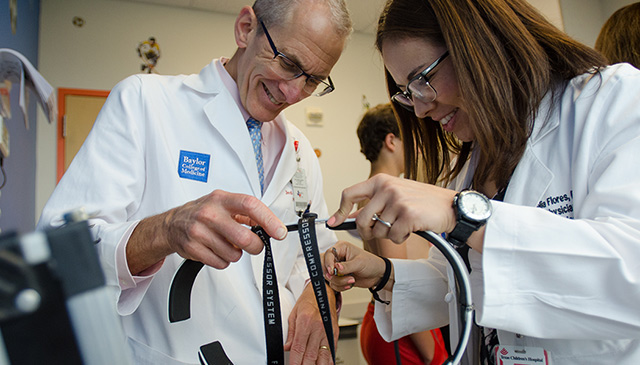
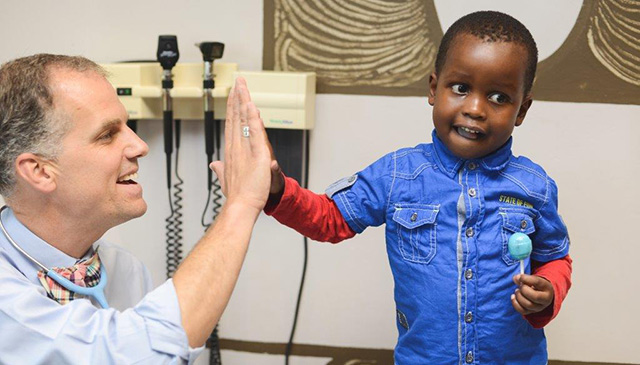 Just 12 short months ago, Texas Children’s Cancer and Hematology Centers, Baylor College of Medicine International Pediatric AIDS Initiative at Texas Children’s Hospital, the Bristol-Myers Squibb Foundation, and leaders in Botswana, Uganda and Malawi, announced a $100 million initiative to create an innovative pediatric hematology-oncology treatment network in sub-Saharan Africa.
Just 12 short months ago, Texas Children’s Cancer and Hematology Centers, Baylor College of Medicine International Pediatric AIDS Initiative at Texas Children’s Hospital, the Bristol-Myers Squibb Foundation, and leaders in Botswana, Uganda and Malawi, announced a $100 million initiative to create an innovative pediatric hematology-oncology treatment network in sub-Saharan Africa.



